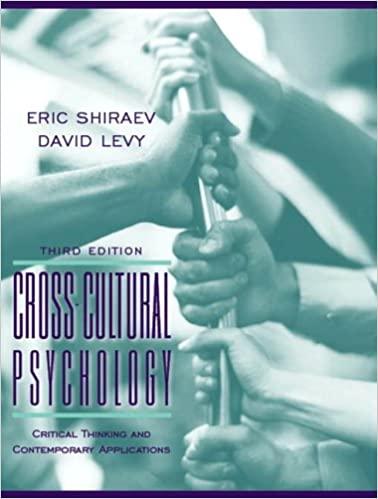Question
Any other thoughts for the ethical dilemmas or unavailable facts sections? Case Study: Sofia is a 15-year-old Puerto Rican female who was referred to the
Any other thoughts for the ethical dilemmas or unavailable facts sections?
Case Study:
Sofia is a 15-year-old Puerto Rican female who was referred to the outpatient mental health clinic by Janie Robertson, FNP, who is the Nurse Practitioner who sees Sofia for regular medical concerns. The outpatient clinic is located in a mid-western state and city where the demographic makeup is as follows: White (63%), Black (14%), Asian (7%), Pacific Islander (3%), and Hispanic/Latino (13%).
The referral form indicated Sofia's primary reason for referral was her scoring an 18 on the Patient Health Questionnaire (PHQ-9) given to her during her routine appointment with the Nurse Practitioner. The case manager who gathered collateral information about Sofia from the mother noted that Sofia lives with both her parents and a younger brother, but that Sofia's parents have experienced significant marital problems, have been separated several times, and are now starting divorce proceedings. Sofia's mother reported having a history of psychiatric treatment for depression and anxiety and indicated that the client's father suffered from bipolar disorder and had been receiving psychiatric treatment, having been hospitalized on multiple occasions during previous years for non-compliance with his medication, resulting in psychotic episodes and violence.
Sofia and her mother arrived for the intake appointment 15 minutes late, stating they had difficulty obtaining transportation because the father used their only vehicle to go to work. Sofia's paperwork indicated Medicaid as her primary insurance. During the intake appointment, Sofia expressed the following symptoms: frequent sadness and crying, increased appetite and overeating, guilt, low self-concept, anxiety, irritability, insomnia, hopelessness, and difficulty concentrating. In addition, she presented with difficulties in her interpersonal relationships, persistent negative thoughts about her appearance and scholastic abilities, as well as guilt regarding her parents' marital problems.
Sofia also disclosed she has a history of self-harming by cutting her upper thigh and stated the last instance was 2 days ago because she was feeling overwhelmed about school. Sofia pleaded with the counselor not to mention this to her mother because Sofia didn't want to be sent to the "crazy hospital" like her father had been before.
Sofia was failing several classes in school, and her family was in the process of looking for a new school due to her failing grades and difficulties getting along with her classmates.
Sofia's medical history revealed that she suffered from asthma, used eyeglasses, and was overweight. Sofia's mother reported that Sofia had been previously diagnosed with Major Depressive Disorder (MDD) 3 years ago, had seen a counselor previously, and is currently prescribed antidepressants by the primary care provider in their hometown.
- Describe the ethical dilemma(s) presented in the case.
The ethical dilemmas stated in this case are as follows:
- Unstable home life
- Unstable school life
- Depression
- Anxiety
- Self-harm
- History of mental illness within the family
- Identify unavailable facts relative to the ethical dilemma(s).
The unavailable facts relative to the ethical dilemmas are as follows:
- Onset of Sofia's depression?
- Friendships?
- Father's current mental state (safety concern?)
- Siblings?
- Taking the depression medication that she is prescribed?
- Any substance use?
Step by Step Solution
There are 3 Steps involved in it
Step: 1

Get Instant Access to Expert-Tailored Solutions
See step-by-step solutions with expert insights and AI powered tools for academic success
Step: 2

Step: 3

Ace Your Homework with AI
Get the answers you need in no time with our AI-driven, step-by-step assistance
Get Started


